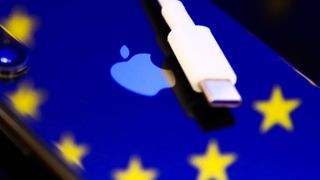Apple must get behind the EU's USB-C decision or be left behind
Arguments against mandating USB-C in the iPhone are futile, especially because Apple has already included the port in the iPad and MacBook

I may have mentioned this once or twice before, but I used to work at a non-League football club. Every Saturday, without fail, one of the players would knock on the office door and ask: “Have you got an iPhone charger?” To which I’d invariably reply: “Which one?”
This was a few years ago, when Apple was making the transition from its own proprietary charger to another proprietary charger; back in the days when an iPhone battery ran out of puff faster than a non-League footballer. Although, given my kids’ iPhones are attached to the wall more often than our landline, I’m not sure those days have yet passed.
So, as I sit here, gazing at the spaghetti of 86 defunct USB cables in my office drawer, I’m fully on board with the EU’s decision to enforce USB-C charging on mobile devices by 2024. My only gripe is that it didn’t do it sooner.
There has been an extraordinary amount of bellyaching about the decision, though, especially from our friends across the Atlantic, who seem to regard the imposition of USB-C as a breach of the second amendment rights. Maybe it has something to do with their right to bear ARMs?
The EU, the critics argue, are stifling choice and innovation. If the Eurocrats had got their act together a decade ago, we’d still be sitting here trying to put fiddly micro-USB cables into our smartphones instead of the far lovelier USB-C.
I’ll concede they have a slither of a point here, but not a convincing one. The EU’s mandating USB-C for now but not forever. If a compelling new charging standard arrives, there’s nothing to stop the EU switching tracks in five years’ time, although I imagine the new standard would have to offer significant benefits over USB-C before it was rubber stamped. This is in no way a bad thing.
As for the restricting choice argument, I’ve never seen anyone walk up to a three-pin plug socket and complain about the lack of choice. I have, on the other hand, sworn very loudly in foreign hotel rooms when I’ve gone to charge my phone at night and realised I’d forgotten to bring a plug adapter. Standardisation is a good thing, especially when it comes to delivering power.
Get the ITPro. daily newsletter
Receive our latest news, industry updates, featured resources and more. Sign up today to receive our FREE report on AI cyber crime & security - newly updated for 2024.
Talking of three-pin plugs, I note the British government was as quick as (ahem) Lightning to distance itself from this EU red tape, declaring (to the Daily Mail, of course) that “we are not currently considering replicating this requirement”. Well, at least there’s one port operating as normal after Brexit.

Talking to a business should feel like messaging a friend
Managing customer conversations at scale with the WhatsApp Business Platform
It’s not as if the EU is swimming against the tide here, either. Every Android phone I’ve seen in the past couple of years has offered USB-C charging. And Apple has been migrating to USB-C itself, on everything from MacBooks to iPads. The last Lightning hold out is the iPhone, but it has felt like only a matter of time before Apple switched to USB-C here too. Given Apple was the first company to stop supplying phone chargers with new handsets, supposedly for environmental reasons, it can hardly complain if it’s being forced to adopt the charger that literally everyone uses.
What about laptops? Well, laptop manufacturers have been given a further 40 months to complete the USB-C switch, although the vast majority have done so already. Having spent hundreds of quid replacing duff proprietary laptop chargers in the past, I’m not about to go the full Farage on this decision either. It is a good thing.
At this point, the Apple fanboys are furiously yanking the power cords out of their MacBook Pros, making the point that Apple recently reintroduced the proprietary MagSafe chargers on its high-end laptops, meaning £3,000 worth of space grey loveliness isn’t destroyed when someone gets their foot wrapped in your power cable. It’s true, but there’s nothing stopping Apple continuing to offer MagSafe on MacBooks; it merely has to offer USB-C charging as an option, something it already does on those MagSafe MacBook Pros (albeit at a lower wattage).
In short, I’ve yet to see a single convincing argument as to why mandating USB-C for charging is a bad thing. And whether the UK chooses to adopt the requirement or not is as irrelevant as the 2am slot on GB News. We will get what we’re given, which will be the standard used by the rest of Europe.
Barry Collins is an experienced IT journalist who specialises in Windows, Mac, broadband and more. He's a former editor of PC Pro magazine, and has contributed to many national newspapers, magazines and websites in a career that has spanned over 20 years. You may have seen Barry as a tech pundit on television and radio, including BBC Newsnight, the Chris Evans Show and ITN News at Ten.





